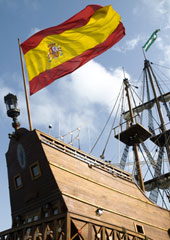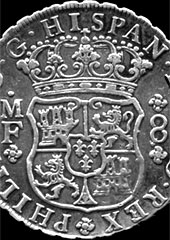Religion and Economic Success in Europe
Why does the idea persist that Europe’s Catholic nations have always been economic slow-growers?
June 2, 2012

In the standard Protestant (particularly Anglo-American) narrative of world history — as found for instance in the works of Hugh Trevor-Roper, David S. Landes or Niall Ferguson — the Counter-Reformation was the reason Catholic Europe lagged behind Protestant Europe in the race for economic prosperity and historic success.
With regard to the strictly economic side of the argument, there is an element of truth in that proposition — though much less so than is normally believed. But when it comes to affirming that the Counter-Reformation was a historic failure, then there are strong reasons to object. Quite on the contrary, by most objective accounts it was quite a success — particularly if looked at from a non-Eurocentric perspective.
During the 17th century, when the Protestant world supposedly overtook its Catholic rivals, the Roman Church (especially its most militant order, the Jesuits) was able not only to contain Protestantism in Europe, it was also able to mount a worldwide preemptive attack against the emerging Protestant powers.
It was even able to regain previously lost terrain in Poland, Lithuania and the Czech region and securing Southern Germany and the Spanish Netherlands, today’s Belgium. It could do this by using and expanding the global networks created and sustained by the Catholic Iberians in a way that the major Protestant countries found hard to emulate.
As Diarmaid MacCulloch explains in his masterful history of the Reformation, the Protestant equivalent of the Catholic world missions did not appear until the 18th century.
Even the prominent Victorian historian Thomas Babington Macaulay had to concede that “the Spiritual force of Protestantism was a mere local militia” when compared to the global reach of Catholicism. “If [a Jesuit] was wanted in Lima, he was on the Atlantic in the next fleet,” Macaulay wrote. “If he was wanted in Bag[h]dad, he was toiling through the desert with the next caravan.”
Contrary to Martin Luther, who saw the world beyond Europe as a moral threat, Ignacio de Loyola and his fellow Jesuits (along with other revitalized missionary orders) saw it as an immense opportunity for a beleaguered Church.
In doing so, they not only gained more new souls than their competitors in the global “religious market.” They also helped protect the interior and much of the periphery of the Catholic empires from assault by their Protestant enemies.
For instance, as the combined result of the Catholic religious revival and secular administrative and economic reforms, the Hispanic Monarchy was able to maintain virtually all of its overseas possessions until the 19th century, even though its power in Europe had diminished long before.
The same goes for Portugal in Brazil and parts of Africa. As for the French Republic, while officially secular, it had no qualms about using the missionary zeal of its Catholic priests to defend its shrinking colonies in North America and expand its empire across Western Africa and Southeast Asia during the 19th century.
The existence of large, distinctive and predominantly non-European, though largely Westernized, Hispanic, Portuguese and French cultural spheres is one of the main legacies of the Catholic Counter-Reformation.
Anyone who cherishes diversity within the increasingly homogenized world of the CNN, BBC, MTV or the Anglo-American economic press, this is good news.
Always prosperous, always poor?
There are serious arguments in favor of Catholicism as a promoter of early capitalism and globalization, both in theory and in practice. But there is still another surprise as to the relative, long-term performance of Protestant and Catholic economies. Per capita GDP statistics from 1500 to 2000, compiled by the late British economist Angus Maddison, show a much more complex pattern of growth in Catholic and Protestant countries than previously thought.
For instance, from 1500 to the end of the 1600s — the period when the main conflict between the Reformation and the Counter-Reformation was played out — per capita GDP in the core Catholic countries (France, Belgium, Spain, Italy, Austria, Ireland and Portugal) was persistently higher than in the core Protestant nations (Switzerland, Norway, Denmark, Sweden, the Netherlands, Finland, Great Britain and Germany), as measured in 1990 international dollars.
The Protestant countries only moved slightly ahead at the beginning of the 18th century, even though Germany or Switzerland lagged behind the average Catholic country well until the 1820s.
The two groups only really started to diverge to any significant degree between 1870 and 1900. In 1850, per capita GDP in the Protestant countries was 1.783 international dollars, compared with 1.419 in the Catholic countries. By 1900, the difference was 3.493 in the former and 2.335 in the latter.
From 1940 onwards, however, the gap shrunk. Between 1960 and 1980, the per capita GDP in the Protestant nations was just 10% higher — and by 2000, the difference was just 6%. In other words, over the centuries, Catholic nations have gone from being slightly richer than Protestant ones, to falling slightly behind, then falling more behind, and finally catching back up.
Though it is early to say, it is possible that the pre-2007 boom years in the Mediterranean countries (plus Ireland) contributed significantly to this process of convergence between Protestant and Catholic Europe.
And while the effects of the eurozone’s current economic crisis is still to be properly measured, it is clear that the media’s fixation on the travails of the predominantly Catholic (and Orthodox) “periphery” has obscured the fact that Europe’s Protestant “core” has also suffered GDP decreases in recent years.
Always financially irresponsible?
The classic argument for Protestantism’s economic and moral superiority is that Protestants are supposedly extremely cautious with their hard-won savings, while Catholics are spendthrift and financially irresponsible. Is there any truth to this argument?
There is no denying that Catholic Spain at the peak of its power was a serious defaulter (although that did not prevent it from maintaining its global domination for quite a long period of time). Likewise, Greece has been virtually bankrupt for most of its history as an independent state, France has not had a balanced budget since the early 1970s, and Italy has hardly been an example of fiscal prudence.
But that is far from the whole story. When it comes to the origin of the biggest financial crises in the history of modern capitalism, where should we look to find blame?
The answer can be found in Charles P. Kindleberger’s classic work on manias, panics and crashes. Here, we learn that of the ten most damaging financial crises that have occurred over the past 300 years (eleven if we include the current meltdown), seven originated in Protestant countries.
And each of them had as their cause what we would today call irrational exuberance — from the Dutch Tulip Bulb Bubble in the 1600s to the South Sea Bubble and the Mississippi Bubble in the 1700s, to late-1900s tech stock bubble in the United States and the bubble caused by lax U.S. monetary policy and the creation and dissemination of toxic financial products by the City of London and Wall Street.
So are Protestants really more financially responsible than Catholics? Or should we conclude that both are more or less equally prone to acts of folly — especially when an exuberant expansion of credit is involved?
In any case, history has not finished playing out yet — and so the final judgment as to the economic performance of Protestants vs. Catholics will have to wait. Whatever that judgment ends up being, one thing is already certain: theology and geography will have nothing to do with it. Instead, it will depend on human agency and the uses or abuses of our freewill — not on predestination.
Editor’s note: This is part two of a two-part essay. Part one is here.
The views and opinions expressed in this article are solely those of the author and do not necessarily reflect any official position of the Spanish government.
Takeaways
In the standard Protestant narrative of world history, the Counter-Reformation was the reason Catholic Europe lagged behind Protestant Europe in the race for economic prosperity.
History has not finished playing out yet — and so the final judgment as to the economic performance of Protestants vs. Catholics will have to wait.
Read previous

The Catholic Origins of Globalization
June 1, 2012
